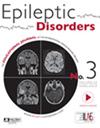The role of genetic testing in adult patients with unexplained epilepsy
Abstract
Objective
Genetic causes are often overlooked in patients with epilepsy of unknown etiology, particularly in adults. We aimed to evaluate clinical features of genetic epilepsy and the utility of genetic testing.
Methods
We retrospectively screened consecutive unrelated adult epilepsy patients at an epilepsy clinic from April 2022 to May 2023. Patients with unknown etiology or special brain lesions were classified as unexplained epilepsy. In them, patients with young-onset seizures or family history of seizures who were recommended for and ultimately underwent genetic testing using either panel next-generation sequencing (NGS) or whole-exome sequencing (WES) were enrolled. A definite or probable genetic diagnosis was established through genotype–phenotype correlation. We compared the demographic characteristics between genetic epilepsy and other etiologies.
Results
Of the 374 adult epilepsy patients, 258 were classified as unexplained epilepsy, 129 were suspected of having genetic epilepsy due to young-onset seizures or a positive family history, 33 underwent genetic testing; 13 harbored variants classified as pathogenic, and 6 reached a definite genetic diagnosis, resulting in a yield of 18%. Among the 27 patients without a definite genetic diagnosis, 7 had a nongenetic structural etiology. Patients with genetic etiology exhibited greater multisystem involvement particularly multiple structural anomalies and early childhood-onset seizures, but wasn't directly correlated with young-onset seizures or a positive family history. The diagnostic yield was comparable between panel NGS and WES.
Significance
In adult patients with unexplained epilepsy, genetic epilepsy is more associated with multisystem involvement and multiple structural anomalies but not family history of seizures or young-onset seizures.

 求助内容:
求助内容: 应助结果提醒方式:
应助结果提醒方式:


